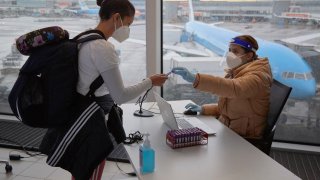
Going home for the holidays just got more complicated, due to Covid's new omicron variant.
On Thursday, the Biden administration tightened protocols for international travelers, including 24-hour testing windows for anyone coming into the country. The White House also extended the nation's federal mask mandates for public transportation hubs, like airports, through March 18.
If you're planning to travel for the winter holidays soon, whether domestically or internationally, you're probably wondering: Is omicron a reason to cancel or delay your trip?
At least for now, there's no straightforward "yes" or "no" answer. Scientists are still working to learn how transmissible omicron is, whether it'll evade vaccine protection and how widespread the cases are worldwide. By mid-December, right around when you might be traveling, researchers should have at least a few answers.
Get top local stories in San Diego delivered to you every morning. Sign up for NBC San Diego's News Headlines newsletter.
But these three questions can help you make an educated decision, especially as scientists discover more about omicron in the coming weeks:
Where are you going?
The following types of people should postpone travel to locations with community transmission of omicron, according to the World Health Organization:
- Unvaccinated people
- People who haven't gotten Covid
- Anyone with underlying conditions that put them at increased risk of severe Covid symptoms
- Individuals over 60 years old
The problem: It's too soon to say exactly where those locations are right now. Nations across the world are currently sequencing genes from Covid test samples to pinpoint omicron cases.
Money Report
So far, the variant has been detected in 38 countries as of Friday morning, including Italy, the U.K., France, Portugal and Mexico. In the United States, cases have appeared in Hawaii, New York, Colorado, Minnesota and California.
"One of the lessons out of this omicron thing is that it probably started way before we actually detected it," Dr. Carlos del Rio, executive associate dean for Emory at Grady Health System and president-elect of the Infectious Diseases Society of America said in a briefing Thursday. "When exactly? We don't know."
Domestic travel protocols in the U.S. remain largely unchanged for now. If you're traveling out of the country, you'll now need to test negative within the 24 hours before you return, regardless of your vaccination status.
Some countries — including Japan, Israel and Morocco — have temporarily barred all foreigners from entering, due to omicron.
Are all members of your travel party vaccinated?
Even before omicron touched down, the Centers for Disease Control and Prevention recommended delaying your travel plans until you're fully vaccinated. That's especially pertinent now.
Put simply: Getting your vaccine and booster shots is the single best way to protect against omicron. The variant contains mutations that could potentially enable it to evade the protection you got from your first round of Covid vaccinations. But the booster shot increases your antibodies levels enough to provide some protection against all Covid variants, including omicron.
Your vaccine and booster doses also prompt your body to generate T cells, which can target and destroy cells infected with a virus. So, if you still test positive for Covid, you're much less likely to get severely sick.
Additionally, you should wear a mask in public indoor settings, physically distance yourself from others and stay vigilant for any Covid signs and symptoms during any periods of upcoming travel.
Can you get tested before and after your travel dates?
Getting Covid tests before and after travel is "a very effective way of knowing if you've been exposed, and then preventing transmitting to others," del Rio said.
Del Rio said he gets tested between 24 and 48 hours before he travels, and again 2-3 days after he lands. Covid tests aren't required for domestic travel in the U.S., but they're still wise.
"As an individual, when I travel on plane, I test myself 24 to 48 hours before I travel," he said. "I test myself two to three days after I land." Even if you're traveling somewhere domestic, where testing is not required, it's still wise.
And if you have time before you need to make your decision to keep or cancel your travel plans, consider waiting just a little bit longer.
"Scientists are sequencing these test results as quickly as they can," Dr. Nicholas Kman, an emergency medicine expert at The Ohio State University Wexner Medical Center, tells CNBC Make It. "But just like all things Covid, we're learning as we go."
Update: This story has been updated to reflect that Covid's omicron variant has been detected in 38 countries, as of Friday morning.
Sign up now: Get smarter about your money and career with our weekly newsletter
Don't miss:
Antibodies aren't everything — Covid vaccines have another secret weapon to fight omicron






